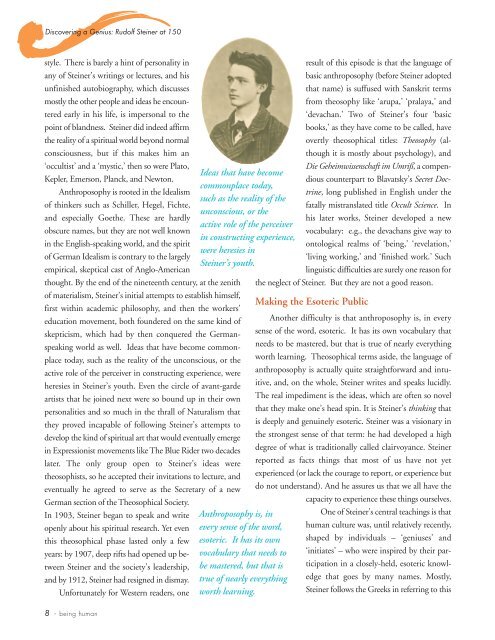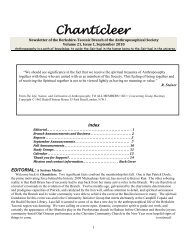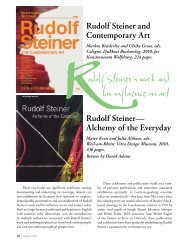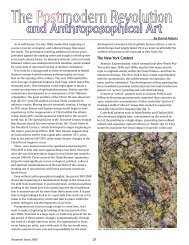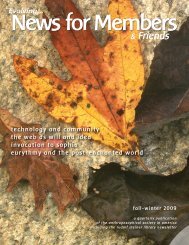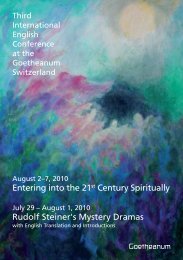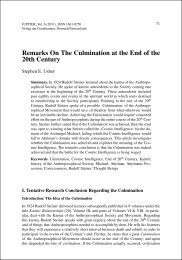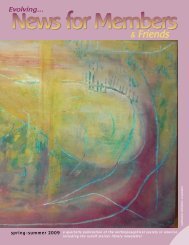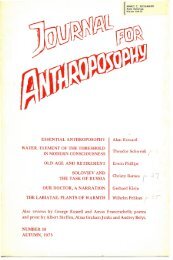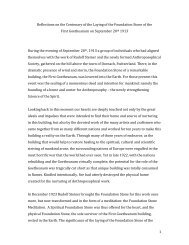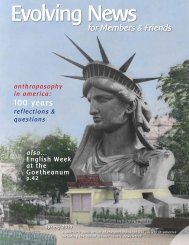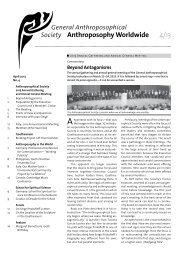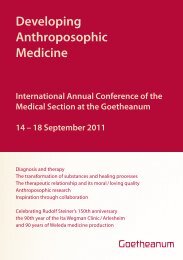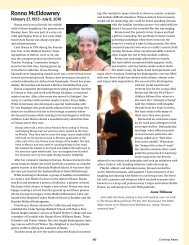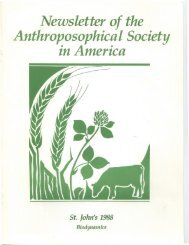Rudolf Steiner's Vision for the Future - Anthroposophical Society in ...
Rudolf Steiner's Vision for the Future - Anthroposophical Society in ...
Rudolf Steiner's Vision for the Future - Anthroposophical Society in ...
You also want an ePaper? Increase the reach of your titles
YUMPU automatically turns print PDFs into web optimized ePapers that Google loves.
Discover<strong>in</strong>g a Genius: <strong>Rudolf</strong> Ste<strong>in</strong>er at 150<br />
style. There is barely a h<strong>in</strong>t of personality <strong>in</strong><br />
result of this episode is that <strong>the</strong> language of<br />
any of Ste<strong>in</strong>er’s writ<strong>in</strong>gs or lectures, and his<br />
basic anthroposophy (be<strong>for</strong>e Ste<strong>in</strong>er adopted<br />
unf<strong>in</strong>ished autobiography, which discusses<br />
that name) is suffused with Sanskrit terms<br />
mostly <strong>the</strong> o<strong>the</strong>r people and ideas he encoun-<br />
from <strong>the</strong>osophy like ‘arupa,’ ‘pralaya,’ and<br />
tered early <strong>in</strong> his life, is impersonal to <strong>the</strong><br />
‘devachan.’ Two of Ste<strong>in</strong>er’s four ‘basic<br />
po<strong>in</strong>t of blandness. Ste<strong>in</strong>er did <strong>in</strong>deed affirm<br />
books,’ as <strong>the</strong>y have come to be called, have<br />
<strong>the</strong> reality of a spiritual world beyond normal<br />
overtly <strong>the</strong>osophical titles: Theosophy (al-<br />
consciousness, but if this makes him an<br />
though it is mostly about psychology), and<br />
‘occultist’ and a ‘mystic,’ <strong>the</strong>n so were Plato,<br />
Kepler, Emerson, Planck, and Newton.<br />
Anthroposophy is rooted <strong>in</strong> <strong>the</strong> Idealism<br />
of th<strong>in</strong>kers such as Schiller, Hegel, Fichte,<br />
and especially Goe<strong>the</strong>. These are hardly<br />
obscure names, but <strong>the</strong>y are not well known<br />
<strong>in</strong> <strong>the</strong> English-speak<strong>in</strong>g world, and <strong>the</strong> spirit<br />
of German Idealism is contrary to <strong>the</strong> largely<br />
empirical, skeptical cast of Anglo-American<br />
Ideas that have become<br />
commonplace today,<br />
such as <strong>the</strong> reality of <strong>the</strong><br />
unconscious, or <strong>the</strong><br />
active role of <strong>the</strong> perceiver<br />
<strong>in</strong> construct<strong>in</strong>g experience,<br />
were heresies <strong>in</strong><br />
Ste<strong>in</strong>er’s youth.<br />
Die Geheimwissenschaft im Umriß, a compendious<br />
counterpart to Blavatsky’s Secret Doctr<strong>in</strong>e,<br />
long published <strong>in</strong> English under <strong>the</strong><br />
fatally mistranslated title Occult Science. In<br />
his later works, Ste<strong>in</strong>er developed a new<br />
vocabulary: e.g., <strong>the</strong> devachans give way to<br />
ontological realms of ‘be<strong>in</strong>g,’ ‘revelation,’<br />
‘liv<strong>in</strong>g work<strong>in</strong>g,’ and ‘f<strong>in</strong>ished work.’ Such<br />
l<strong>in</strong>guistic difficulties are surely one reason <strong>for</strong><br />
thought. By <strong>the</strong> end of <strong>the</strong> n<strong>in</strong>eteenth century, at <strong>the</strong> zenith <strong>the</strong> neglect of Ste<strong>in</strong>er. But <strong>the</strong>y are not a good reason.<br />
of materialism, Ste<strong>in</strong>er’s <strong>in</strong>itial attempts to establish himself,<br />
first with<strong>in</strong> academic philosophy, and <strong>the</strong>n <strong>the</strong> workers’<br />
Mak<strong>in</strong>g <strong>the</strong> Esoteric Public<br />
education movement, both foundered on <strong>the</strong> same k<strong>in</strong>d of Ano<strong>the</strong>r difficulty is that anthroposophy is, <strong>in</strong> every<br />
skepticism, which had by <strong>the</strong>n conquered <strong>the</strong> German- sense of <strong>the</strong> word, esoteric. It has its own vocabulary that<br />
speak<strong>in</strong>g world as well. Ideas that have become common- needs to be mastered, but that is true of nearly everyth<strong>in</strong>g<br />
place today, such as <strong>the</strong> reality of <strong>the</strong> unconscious, or <strong>the</strong> worth learn<strong>in</strong>g. Theosophical terms aside, <strong>the</strong> language of<br />
active role of <strong>the</strong> perceiver <strong>in</strong> construct<strong>in</strong>g experience, were anthroposophy is actually quite straight<strong>for</strong>ward and <strong>in</strong>tu-<br />
heresies <strong>in</strong> Ste<strong>in</strong>er’s youth. Even <strong>the</strong> circle of avant-garde itive, and, on <strong>the</strong> whole, Ste<strong>in</strong>er writes and speaks lucidly.<br />
artists that he jo<strong>in</strong>ed next were so bound up <strong>in</strong> <strong>the</strong>ir own The real impediment is <strong>the</strong> ideas, which are often so novel<br />
personalities and so much <strong>in</strong> <strong>the</strong> thrall of Naturalism that that <strong>the</strong>y make one’s head sp<strong>in</strong>. It is Ste<strong>in</strong>er’s th<strong>in</strong>k<strong>in</strong>g that<br />
<strong>the</strong>y proved <strong>in</strong>capable of follow<strong>in</strong>g Ste<strong>in</strong>er’s attempts to is deeply and genu<strong>in</strong>ely esoteric. Ste<strong>in</strong>er was a visionary <strong>in</strong><br />
develop <strong>the</strong> k<strong>in</strong>d of spiritual art that would eventually emerge <strong>the</strong> strongest sense of that term: he had developed a high<br />
<strong>in</strong> Expressionist movements like The Blue Rider two decades degree of what is traditionally called clairvoyance. Ste<strong>in</strong>er<br />
later. The only group open to Ste<strong>in</strong>er’s ideas were reported as facts th<strong>in</strong>gs that most of us have not yet<br />
<strong>the</strong>osophists, so he accepted <strong>the</strong>ir <strong>in</strong>vitations to lecture, and experienced (or lack <strong>the</strong> courage to report, or experience but<br />
eventually he agreed to serve as <strong>the</strong> Secretary of a new do not understand). And he assures us that we all have <strong>the</strong><br />
German section of <strong>the</strong> Theosophical <strong>Society</strong>.<br />
capacity to experience <strong>the</strong>se th<strong>in</strong>gs ourselves.<br />
In 1903, Ste<strong>in</strong>er began to speak and write Anthroposophy is, <strong>in</strong><br />
One of Ste<strong>in</strong>er’s central teach<strong>in</strong>gs is that<br />
openly about his spiritual research. Yet even every sense of <strong>the</strong> word, human culture was, until relatively recently,<br />
this <strong>the</strong>osophical phase lasted only a few esoteric. It has its own shaped by <strong>in</strong>dividuals – ‘geniuses’ and<br />
years: by 1907, deep rifts had opened up be- vocabulary that needs to ‘<strong>in</strong>itiates’ – who were <strong>in</strong>spired by <strong>the</strong>ir partween<br />
Ste<strong>in</strong>er and <strong>the</strong> society’s leadership, be mastered, but that is ticipation <strong>in</strong> a closely-held, esoteric knowl-<br />
and by 1912, Ste<strong>in</strong>er had resigned <strong>in</strong> dismay. true of nearly everyth<strong>in</strong>g edge that goes by many names. Mostly,<br />
Un<strong>for</strong>tunately <strong>for</strong> Western readers, one worth learn<strong>in</strong>g.<br />
Ste<strong>in</strong>er follows <strong>the</strong> Greeks <strong>in</strong> referr<strong>in</strong>g to this<br />
8 • be<strong>in</strong>g human


